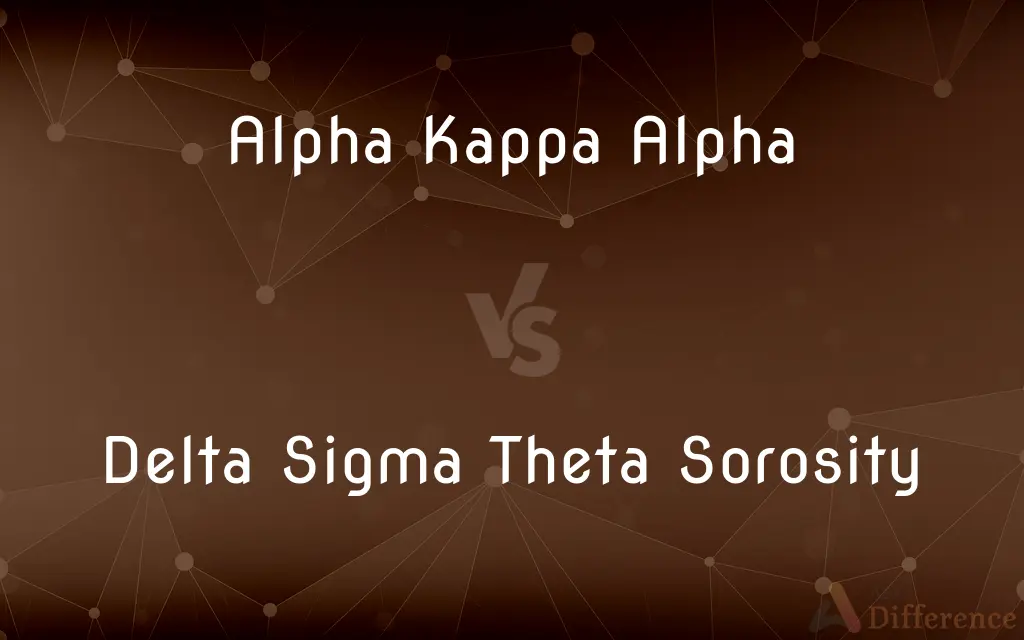Alpha Kappa Alpha vs. Delta Sigma Theta Sorosity — What's the Difference?
By Tayyaba Rehman & Urooj Arif — Published on October 13, 2024
Alpha Kappa Alpha and Delta Sigma Theta are both prominent African-American sororities, but AKA focuses on service to all mankind with a more traditional approach, while Delta emphasizes social action and advocacy.

Difference Between Alpha Kappa Alpha and Delta Sigma Theta Sorosity
Table of Contents
ADVERTISEMENT
Key Differences
Alpha Kappa Alpha Sorority, Inc. (AKA), established in 1908 at Howard University, is recognized as the first Greek-lettered sorority founded by African-American college-educated women. It emphasizes service, scholarship, and sisterhood, aiming to improve the social stature of African-Americans and the global community. Delta Sigma Theta Sorority, Inc. (Delta), founded in 1913 also at Howard University, was created by 22 former members of AKA with a focus on social action and empowering marginalized communities. While both sororities share common goals of service and education, Delta specifically highlights political awareness and involvement.
While AKA is known for its signature pink and green colors and a symbol of the ivy leaf, reflecting growth and development, Delta adopts the colors crimson and cream, symbolizing courage, and has the elephant and the delta symbol as its emblems, indicative of strength and change. These symbols and colors not only distinguish the sororities visually but also embody their respective values and missions.
AKA and Delta engage in a wide array of philanthropic activities and educational programs. AKA's programs are diverse, including health, education, family, and environmental initiatives under its "Service to All Mankind" motto. Delta, on the other hand, has a strong focus on social justice, with initiatives like the Delta Sigma Theta Sorority’s National Social Action Commission aiming to promote political activism and legislative change in alignment with its mission to transform society.
Membership in either sorority is a lifetime commitment, with both organizations offering collegiate and alumnae membership. AKA and Delta have a significant impact on their members' personal and professional development, providing networking opportunities, leadership training, and a strong sense of community. However, the process of joining, including the emphasis on academic achievement, community service, and personal character, reflects their individual values and missions.
Despite their similarities, AKA and Delta maintain distinct identities and historical legacies. AKA's legacy is deeply rooted in being the first sorority of its kind, setting a precedent for African-American Greek life, whereas Delta's foundation is built upon a desire to directly address and support social justice and empowerment issues, marking its own unique path in the history of African-American collegiate organizations.
ADVERTISEMENT
Comparison Chart
Founded
1908, Howard University
1913, Howard University
Focus
Service, Scholarship, Sisterhood
Social Action, Advocacy
Colors
Pink and Green
Crimson and Cream
Symbols
Ivy Leaf
Elephant, Delta Symbol
Key Initiatives
Health, Education, Environment
Political Activism, Social Justice
Compare with Definitions
Alpha Kappa Alpha
The first Greek-lettered sorority established by African-American women, focusing on service and sisterhood.
A member of Alpha Kappa Alpha volunteered at a local school to promote literacy.
Delta Sigma Theta Sorosity
Established by women who sought to focus more directly on social and political issues.
Delta Sigma Theta has been integral in movements for civil rights and women's empowerment since its inception.
Alpha Kappa Alpha
Emphasizes a broad spectrum of service projects under "Service to All Mankind."
Alpha Kappa Alpha's health initiative offers free screenings in underserved communities.
Delta Sigma Theta Sorosity
Elephant and delta symbol, indicating strength and change.
The elephant, representing Delta Sigma Theta's strength in advocacy, features prominently in their events.
Alpha Kappa Alpha
Ivy leaf, representing growth and development.
The ivy leaf, a symbol of Alpha Kappa Alpha, is incorporated into their chapter decorations.
Delta Sigma Theta Sorosity
A sorority founded on principles of social action and empowerment of African-American communities.
Delta Sigma Theta members led a voter registration drive to promote political awareness.
Alpha Kappa Alpha
Pink and green, symbolizing femininity and renewal.
The Alpha Kappa Alpha members wore their traditional pink and green at the community service event.
Delta Sigma Theta Sorosity
Crimson and cream, denoting courage and purity.
At the inauguration of their social justice seminar, Delta Sigma Theta sorority members donned crimson and cream.
Alpha Kappa Alpha
Prides itself as the pioneer sorority for African-American college-educated women.
Alpha Kappa Alpha has a long history of breaking barriers for African-American women in higher education.
Delta Sigma Theta Sorosity
Known for its focus on political activism and social justice efforts.
Delta Sigma Theta's national convention focused on strategies for social change and political engagement.
Common Curiosities
What is the main difference between AKA and Delta?
AKA focuses on service and sisterhood, while Delta emphasizes social action and political involvement.
What are the symbols of AKA and Delta, and what do they represent?
AKA's symbol is the ivy leaf, representing growth, while Delta's symbols, the elephant and delta, signify strength and change.
Can someone be a member of both AKA and Delta?
No, membership in one sorority typically precludes membership in another due to their distinct missions and values.
How do AKA and Delta contribute to their communities?
Both sororities contribute through educational programs, health initiatives, and advocacy efforts, tailored to their respective missions.
Why were Delta Sigma Theta's founders originally part of AKA?
The founders of Delta were originally part of AKA but left to create an organization with a stronger focus on social and political issues.
What is the historical significance of AKA and Delta?
AKA is the first African-American Greek-lettered sorority, while Delta is known for its focus on social action from its inception.
What are the membership requirements for AKA and Delta?
Membership requirements include a commitment to service, academic achievement, and adherence to the sorority's values and mission.
How do the educational programs of AKA and Delta differ?
AKA's programs are varied, including STEM and literacy, while Delta's may focus more on political education and social issues.
Can alumni of AKA and Delta remain active in the sororities?
Yes, both sororities have alumnae chapters, allowing members to remain active and engaged after college.
How do the initiation processes for AKA and Delta compare?
Both sororities have rigorous initiation processes emphasizing academic achievement, community service, and personal integrity, reflecting their values.
Are AKA and Delta active internationally?
Yes, both AKA and Delta have international programs and chapters, extending their service and advocacy globally.
How do the philanthropic efforts of AKA and Delta differ?
AKA's efforts are broad, including health and education, while Delta focuses on social justice and political activism.
What role do AKA and Delta play in the empowerment of African-American women?
Both sororities provide leadership training, networking, and support for personal and professional development, empowering their members.
What distinguishes AKA and Delta from other Greek organizations?
Both sororities distinguish themselves through their historical significance, focus on African-American communities, and commitment to service and advocacy.
How do AKA and Delta address social issues?
AKA addresses social issues through service and educational initiatives, while Delta takes a more direct approach with political activism and advocacy.
Share Your Discovery

Previous Comparison
Horse vs. Zebra
Next Comparison
Pledging vs. DonatingAuthor Spotlight
Written by
Tayyaba RehmanTayyaba Rehman is a distinguished writer, currently serving as a primary contributor to askdifference.com. As a researcher in semantics and etymology, Tayyaba's passion for the complexity of languages and their distinctions has found a perfect home on the platform. Tayyaba delves into the intricacies of language, distinguishing between commonly confused words and phrases, thereby providing clarity for readers worldwide.
Co-written by
Urooj ArifUrooj is a skilled content writer at Ask Difference, known for her exceptional ability to simplify complex topics into engaging and informative content. With a passion for research and a flair for clear, concise writing, she consistently delivers articles that resonate with our diverse audience.















































